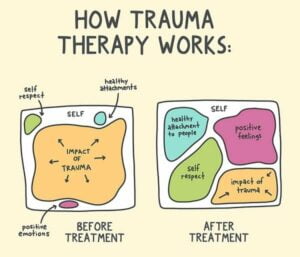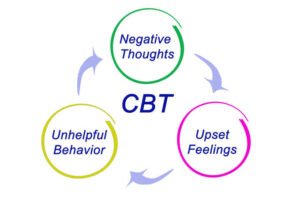Contents
- 1 What Is Trauma Counseling?
- 2 Why Do People Need Trauma Counseling?
- 3 Types Of Trauma Counseling
- 4 Benefits Of Trauma Counseling
- 5 How Does Trauma Counseling Help?
- 6 Who Provides Trauma Counseling?
- 7 Who Should Consider Seeing A Therapist?
- 8 Tips for finding Right Therapist For Trauma Counseling
- 9 Common Myths About Therapy
- 10 Different Therapy Approaches For Dealing With Trauma
- 11 A Word From MantraCare
What Is Trauma Counseling?

Trauma counseling is a form of therapy that helps people who have experienced a traumatic event. Traumatic events can include things like car accidents, natural disasters, or sexual assault. Trauma counseling can help people to cope with the emotions they are feeling after a traumatic event. It can also help them to deal with any physical or psychological problems that they may be experiencing.
In the wake of a disaster, people often experience feelings of guilt and shame. It is important to remember that these emotions are normal and can be dealt with through therapy. Therapy helps you work through your thoughts and feelings on your own terms. It also gives you an opportunity to share those thoughts and feelings with someone who understands what you’re going through – someone who has had similar experiences or has spent time as a trauma counselor themselves. Trauma counseling allows individuals to learn about their reactions in order to better understand them, which can lead to greater self-awareness and empowerment within themselves.
Why Do People Need Trauma Counseling?
People need trauma counseling to help them heal. Trauma counseling is a form of psychotherapy that aims to help people who have experienced or witnessed traumatic events, such as domestic violence, accidents, combat, natural disasters, and acts of terrorism. The goal of trauma counseling is to reduce the negative effects on an individual’s physical health and psychological well-being caused by trauma.
People who have experienced a traumatic event may have signs of stress or PTSD. Trauma counseling can help them relax and cope with the emotional reactions they are going through so that they can resume their normal life again. People may also need trauma counseling because of chronic pain, anxiety, depression, substance abuse, and other issues. Trauma counseling can help them get rid of the root cause of their problems and live healthy and happy life.
Types Of Trauma Counseling
 There are two primary forms of trauma counseling: EFT or Eye Movement Desensitization and Reprocessing Therapy, and EMDR or Eye Movement Desensitization and Reprocessing therapy.
There are two primary forms of trauma counseling: EFT or Eye Movement Desensitization and Reprocessing Therapy, and EMDR or Eye Movement Desensitization and Reprocessing therapy.
EFT- EFT is a type of psychotherapy that uses techniques similar to acupuncture. During trauma counseling, the therapist makes specific hand movements over parts of the body while asking you to recall traumatic experiences. This process helps your brain reprocess the memories so that they are no longer upsetting.
EMDR- EMDR therapy was developed by Francine Shapiro and includes the use of eye movements, sounds, or tapping to help reprocess memories. The idea is that by stimulating different regions in the brain when you are thinking about traumatic events, you can change the way your brain stores memories.
During both EFT and EMDR therapy sessions, the therapist might ask you to draw pictures or play other games to elicit emotions and help the therapy process.
Benefits Of Trauma Counseling
People who receive trauma counseling often report a decrease in symptoms such as flashbacks, intrusive thoughts, nightmares, and hypervigilance. They also tend to have fewer physical problems such as headaches, stomachaches, and pain. In addition, people who receive trauma counseling often have improved emotional well-being, better romantic relationships, and improved overall quality of life.
trauma counseling is an important step in the healing process for people who have experienced a traumatic event. The goal of trauma counseling is to help people reduce the negative effects on their physical health and the psychological well-being of patients. People who have experienced a traumatic event may have signs of stress or PTSD, and trauma counseling can help them relax and cope with the emotions they are feeling. So that they can resume their normal life again. Being able to feel safe, secure, and calm after a traumatic event is crucial to healing physically and emotionally.
How Does Trauma Counseling Help?
 Trauma counseling helps people who have experienced a traumatic event. The goal of trauma counseling is to reduce the negative effects on an individual’s physical health and psychological well-being that are the result of trauma. People who experience trauma may also need trauma counseling because of chronic pain, anxiety, depression, substance abuse, and other issues. Trauma counseling can help them get rid of the root cause of their problems and live healthy and happy life. Trauma counseling can help them get rid of the root cause of their problems and live healthy and happy life.
Trauma counseling helps people who have experienced a traumatic event. The goal of trauma counseling is to reduce the negative effects on an individual’s physical health and psychological well-being that are the result of trauma. People who experience trauma may also need trauma counseling because of chronic pain, anxiety, depression, substance abuse, and other issues. Trauma counseling can help them get rid of the root cause of their problems and live healthy and happy life. Trauma counseling can help them get rid of the root cause of their problems and live healthy and happy life.
Although trauma counseling is not a replacement for medication. It can be a very helpful addition to a psychiatric treatment plan. It can also be beneficial for people who are not interested in taking medication or do not want to talk about their experiences with a psychiatrist.
So, if you have recently experienced a traumatic event and are struggling with the negative effects, consider seeking out a therapist who specializes in trauma counseling. You will likely find that this type of therapy can help you get your life back on track.
Who Provides Trauma Counseling?
A therapist, social worker, or psychologist who is trained in trauma counseling may provide the treatment. This type of psychotherapy is usually conducted once a week for an hour during regular office hours. Sessions typically last 50 minutes. The therapist will work with you to develop a treatment plan that meets your needs.
Who Should Consider Seeing A Therapist?
It is important for anyone who has experienced a traumatic event to find a therapist. So they can move forward and heal. Trauma counseling is beneficial for people who have experienced chronic pain, anxiety, depression, substance abuse, and other issues. So they can get rid of the root cause of their problems and live healthy and happy lives. People who have experienced a traumatic event may also need trauma counseling. Because the memories that they experience sometimes interrupt their life and cause them to suffer from PTSD or stress.
The goal of trauma counseling is to reduce the negative effects on an individual’s physical health and psychological well-being caused by trauma.
Another purpose of trauma counseling is to help people after they have been abused or had any emotional difficulty with something else. The counselor will help the person to talk about what happened and might also offer suggestions on how to change their life. So that they stop feeling the aftershock of the traumatic event.
Tips for finding Right Therapist For Trauma Counseling

When looking for a therapist for trauma counseling. It’s important to find someone who is a good fit for you. Here are some tips for finding the right therapist:
- Look for a therapist who has a license and experience in treating trauma.
- Make sure the therapist is open and understanding about your needs.
- Choose a therapist who you feel comfortable talking to.
- Trust your instincts and if something doesn’t feel right, don’t be afraid to switch therapists.
- If you’re not sure where to start, ask your friends or family for recommendations, or contact your insurance company for a list of therapists in your area.
Trauma counseling can be incredibly helpful in healing the psychological effects of trauma. If you’re struggling with the aftermath of a traumatic event, please don’t hesitate to seek help. There is no shame in seeking help and there is no wrong way to heal. With time and patience, you can overcome the effects of trauma and reclaim your life.
Common Myths About Therapy
It’s common for people to have a lot of myths about therapy. It’s understandable – therapy is a really personal and strange thing.
Therapy Makes Trauma Disappear
One myth that people often believe is that therapy will make you forget about your trauma, or that it will make the effects disappear. That’s not true at all. In fact, the goal of therapy is to gradually help you process your memories and emotions as you learn coping skills to deal with them in a healthy way.
Therapy doesn’t make trauma disappear- instead, it helps you learn how to live with it and process it in a healthier way.
Therapy works with the natural healing abilities of the body and mind by enabling patients to speak freely with a trained professional who can guide them through their thoughts and feelings.
It Is Expensive
Another common myth is that therapy is expensive and only for rich people. This isn’t true at all. In fact, many therapists offer a sliding scale fee, which means that you can pay based on your income. There are also many insurance plans that cover therapy.
If the cost of therapy is a concern for you, be sure to ask about the therapist’s fee structure and see if they offer a sliding scale fee. You can also check with your insurance company to see if they cover mental health services.
Therapy Is For Messed Up People

The final myth about therapy is that it’s only for people who are really messed up. This isn’t true either! Everyone can benefit from therapy. It doesn’t matter how “sick” or “crazy,” you think you are. The benefit of therapy is that it’s a safe space for you to learn how to cope with the emotional difficulties in your life and work through them in a healthy way.
If you’re struggling with something, even if it seems small or silly, therapy can help.
In the end, therapy isn’t really about being “sick” or “healthy”. It’s about making everyday life easier by learning more effective skills for coping with life’s challenges. Therapy gives us an opportunity to get out of our heads and focus on ourselves. Like what we want, what we need, and who we want to be moving forward.
Therapy helps us connect our daily struggles to past experiences so that we can start to make sense of them and find resolutions.
Different Therapy Approaches For Dealing With Trauma
Different therapy approaches can be used to help people deal with trauma. The approach that a doctor suggests to the patient depends on the level of severity of the traumatized person. A person who has been severely traumatized will require a different approach than someone who has had an experience only rated “high” on the traumatic event scale.
The best approach may also depend on what type of trauma has occurred. For example, one might need an entirely different approach for dealing with interpersonal violence or assault-related trauma as opposed to combat-related trauma.
There are many different approaches to try when working with trauma. But there are some general approaches that are more commonly in use for the treatment of trauma. These include cognitive behavioral therapy, Eye Movement Desensitization and Reprocessing (EMDR), and somatic experiencing.
Cognitive Behavioral Therapy
 Cognitive-behavioral therapy, or CBT, is a type of psychotherapy that focuses on the relationship between thoughts, feelings, and behaviors. This approach helps people to identify and change negative thought patterns that can lead to distress and problematic behaviors.
Cognitive-behavioral therapy, or CBT, is a type of psychotherapy that focuses on the relationship between thoughts, feelings, and behaviors. This approach helps people to identify and change negative thought patterns that can lead to distress and problematic behaviors.
CBT has been shown to be effective for treating a variety of mental health conditions, including posttraumatic stress disorder (PTSD). It can help people to understand how their thoughts and emotions are related to their behavior and can provide them with tools to manage PTSD symptoms.
Eye Movement Desensitization And Reprocessing
EMDR is a type of psychotherapy that resolves symptoms resulting from disturbing and traumatic life experiences such as combat, natural disasters, sexual assault, and other events. This approach involves using eye movements or auditory tones while recalling the event to help the mind process the memories.
EMDR is quite effective for treating PTSD in adults. A meta-analysis of randomized controlled studies found that EMDR treatment was associated with a decrease in PTSD symptoms and an improvement in other mental health conditions (e.g., depression) when compared to waitlist controls or treatment as usual.
Somatic Experiencing
 Somatic experiencing is a type of psychotherapy that helps people become aware of their internal reactions to trauma. So they can begin feeling safe again. It differs from CBT in that it doesn’t attempt to work with thoughts or feelings, but rather focuses on bodily sensations.
Somatic experiencing is a type of psychotherapy that helps people become aware of their internal reactions to trauma. So they can begin feeling safe again. It differs from CBT in that it doesn’t attempt to work with thoughts or feelings, but rather focuses on bodily sensations.
Somatic experiencing effectively treats people with PTSD symptoms that are associated with trauma (e.g., flashbacks, nightmares). A systematic review found somatic experiencing was more effective than waitlist control groups. And as effective as other forms of psychotherapy for the treatment of PTSD symptoms after sexual assault.
Group Therapy
Group therapy can also be an effective approach for treating trauma. This type of therapy provides a space for people to share their experiences with others who understand what they are going through. It can also provide support and validation, as well as a sense of community.
There are many different approaches to dealing with trauma. It is important to find the approach that is best suits you or the patient. If you are struggling with PTSD symptoms after a traumatic event, consider seeking out professional help. A therapist can help you identify and change negative thoughts and behaviors that may be preventing you from moving on from the trauma.
All approaches should include some components including psychoeducational distorted, venting techniques (e.g., diaphragmatic breathing), skill-building (e.g., challenging negative beliefs), processing of traumatic memories (including imaginal exposure), working through avoidance behaviors, identification and modification of thinking patterns, education about stress reactions and how to manage them, and relapse prevention.
The most effective approaches are the ones that an individual take according to their specific needs. If you are struggling with trauma. Then it is important to seek out help from a trained professional who can provide you with the support you need. Remember that there are many different ways of dealing with trauma symptoms. So don’t hesitate to ask your doctor or therapist for suggestions on how they might best approach your treatment plan.
A Word From MantraCare
Your mental health — your psychological, emotional, and social well-being — has an impact on every aspect of your life. Positive mental health essentially allows you to effectively deal with life’s everyday challenges.
If you are looking for affordable Online Counseling MantraCare can help: Book a trial therapy session


